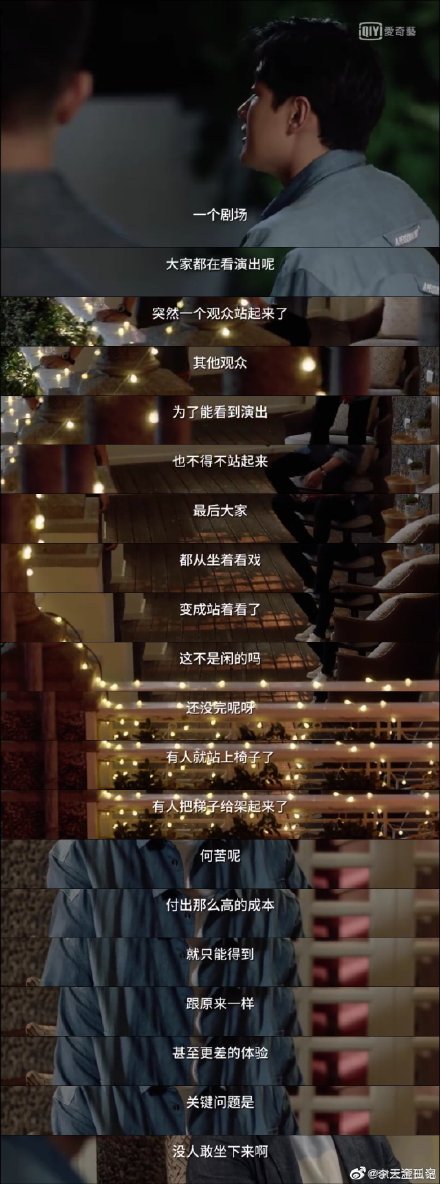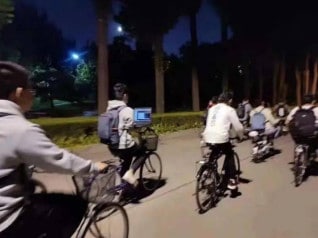A scene from the Chinese TV drama A Love for Dilemma (“小舍得”) has reignited online discussions on the concept of nèijuǎn 内卷, “involution,” which was also a top buzzword in China in 2020.
A Love for Dilemma is a 2021 TV drama directed by Zhang Xiaobo (张晓波), who also worked on other hit series including Nothing But Thirty. This season’s popular TV drama A Love for Dilemma is themed around family, parenting, and China’s competitive education system.
In the series, two stepsisters compete against each other over the school results of their children. The family’s ‘grandpa’, played by famous actor Zhang Guoli (张国立), tries to create harmony around the dinner table between his daughter and stepdaughter, but the rivalry between the two and how they raise their children intensifies nevertheless.

Scene from A Love for Dilemma.
While stepsister Tian Yulan urges her little son to work hard in school and focus on his grades so that he can go to the best high school and university, sister Nan Li places more emphasis on the general development of her children and wants them to enjoy their childhood. Both mothers, however, question their own choices when facing challenges with how their children perform at school.
The specific scene that has ignited current discussions is a dialogue between the husbands of the sisters, who sit outside to talk about the education system and how it sometimes feels like everyone is in a theatre watching a show together until one person stands up from their seat. This makes it necessary for other members of the audience to also stand up, until everybody is standing.
The dialogue continues, with the two talking about how it does not stop at the people standing up. Because then there are those who will take it a step further and will stand on their seats to rise above the others. And then there are even those who will grab a ladder to stand higher than the rest. But they are still watching the same show and their situation has actually not changed at all – except for the fact that everybody is now more uncomfortable than they were before.

Many netizens found it striking how this dialogue explains how the term ‘involution’ is used in China nowadays. After the show aired, the hashtag “How to commonly explain involution” (#如何通俗解释内卷#) became a trending topic in the week of April 19, receiving 260 million views in a few days.
What Is ‘Involution’?
As explained by Jialing Xie in this top buzzword article on What’s on Weibo, involution describes the economic situation in which as the population grows, per capita wealth decreases. Since recently, this word has come to be used to represent the competitive circumstances in academic or professional settings in China where individuals are compelled to overwork because of the standard raised by their peers who appear to be even more hardworking.
The term ‘involution’ and how it is used today comes from a work by American anthropologist Clifford Geertz titled Agricultural Involution – The Processes of Ecological Change in Indonesia (1963). In this work, Geertz explores the agricultural dynamics in Indonesia during the colonial period’s Cultivation System, where a radical economic dualism existed within the country: a foreign, Dutch economy and a native, Indonesian economy (p. 61-62).

Geertz describes how the Javanese faced a deepening demographic dilemma as they saw a rapidly growing population but a static economy, while the Dutch, who organized Javanese land and labor, were only growing in wealth (69-70). Agricultural involution is the “ultimately self-defeating process” that emerged in Indonesia when the ever-growing population was absorbed in high labor-intensive wet-rice cultivation without any changing patterns and without any progress (80-81).
When Geertz used the term ‘involution’ to describe the dynamics in Indonesia, he built on the work of another American anthropologist, namely Alexander Goldenweiser, who also used the term to describe “those culture patterns which, after having reached what would seem to be a definitive form, nonetheless fail either to stabilize or transform themselves into a new pattern but rather continue to develop by becoming internally more complicated” (Geertz 1963, 81).
The Involution Concept in the Chinese Context
The popular use of the Chinese translation of ‘involution’, nèijuǎn 内卷, started to receive attention in Chinese media in 2020. It is deviating from the original use of the term and is meant to explain the social dynamics of China’s growing middle class.
As suggested in the article “‘Involution’: The Anxieties of Our Time Summed Up in One Word” by Zhou Minxi (CGTN), the popularity of the term comes from “a prevalent sense of being stuck in an ever so draining rat race where everyone loses.”
China’s ever-growing middle class is now facing the question of how they and their children can remain in the middle class in a situation where everyone is continuously working harder and doing all they can to rise above the rest. Xiang Biao, a professor of social anthropology at Oxford University, is quoted by Zhou:
“The lower class still hopes to change their fate, but the middle and upper classes aren’t so much looking upward, and they are marked by a deep fear of falling downward. Their greater fear is perhaps losing what they already have.”
The term ‘involution’ often comes up together with criticism on China’s ‘996’ work system (working from 9am-9pm, 6 days a week). Although Alibaba founder Jack Ma once called the 12-hour working day a “blessing,” the system is a controversial topic, with many condemning how Chinese (tech) companies are exploiting their employees, who are caught in a conundrum; they might lose their sanity working such long hours, and might lose their job and future career prospects if they refuse to do so.

But the term also comes up when discussing China’s education system, where competition starts as early as kindergarten and the pressure on children to succeed in the ‘gaokao’ college entrance exam starts many years before it takes place.

This image shows the “juan” 卷 character from ‘nei juan’ (involution) changing into a person on their bike with laptop. Image via http://www.bajieyou.com/new/431e6ef39aac4a6da232671122f66ff4
This discussion also came up with a now-famous image of a student riding his bike while also working on his laptop, using every moment to study. This was then also called “Tsinghua Inversion” (清华内卷), referring to one of China’s top universities, where competition is so vicious that students must double their efforts to catch up with others.
‘Involution’ Discussions on Chinese Social Media
By mid-2020, ‘involution’ attracted the attention on Weibo when popular academic accounts started discussing the term. Recently, ‘involution’ is used so often on Chinese social media that it has already gone beyond its original context, leading to many people discussing its meaning.
“We are forced to work overtime and are unable to resist, and yet it seems that everyone is doing it out of free will,” one Weibo user says, with another person adding: “The abnormal state of inversion has already become our normal state.”
A popular legal blogger (@皇城根下刀笔吏) on Weibo writes:
“It is an internal bottomless vicious cycle of competition. For example, everyone used to work eight hours per day, five days per week. Then one company comes up where people work twelve hours per day, six days per week. Then this company will have major competitive strength in the market economy. But the outcome is that other companies are also compelled to do the same in order to compete. As time goes by, all companies will shift to a twelve-hour workday, six days a week, and job applicants entering the market can’t find any eight-hour workday positions for five days a week anymore. So, if another company wants to beat its competitors, it will have to introduce a seven-day workweek. And then other companies will need to follow in order to make a living. That is involution.”
By now, there are various images and memes that have come to represent the meaning of ‘involution’ in present-day China, such as one cram school sign saying: “If you come we will train your kids, if you don’t come, we will train the competitors of your kids.”

“The society’s resources are in short supply and to obtain the limited supplies, people are all madly practicing their skills to obtain them – regardless if they need them or not,” another Weibo user says.
Most comments relating to the discussion of ‘involution’ on Chinese social media express a sense of fatigue with an ongoing rat-race in the education and employment market.
On the interest-based social networking platform Douban, there are even some support groups for people who feel stuck in ‘involution’ and are looking for a way out. The “Center for Victims of Involution” (内卷受害者收容中心) group has over 3000 members, with smaller groups such as “Let’s Escape Involution Together” (我们一起逃离内卷) having a few dozen participants.
The generation that is mostly affected by this sense of socioeconomic stagnation is the post-90 generation. In 2020, a record high of 8.74 million university graduates entered the job market, but their chances of finding a job that suits their education and personal expectations are slim; many industries are recruiting fewer people than before in an employment market that was already competitive before the COVID19 pandemic. It leaves them facing a troubling Catch 22 situation: they will be stressed and pressured if they do not find that top job, but when they do, they are often also stressed and pressured.

It is a recurring topic on social media. Five years ago, a song by the Rainbow Chamber Singers (彩虹室内合唱团) titled “The Sofa Is So Far” immediately became a hit in China. Many young Chinese recognized themselves in the hardworking and tired people described in the lyrics, which started with: “My body feels empty / I am dog-tired / I don’t want work overtime.”
How to get away from the involution rat race is also a much-discussed topic on Weibo, where the hashtag page “How can young people resist involution” (#年轻人如何反内卷#) has received over 280 million views.
Some suggest the answer to ending the vicious cycle is to find a way to get rich fast, others suggest that not getting married and staying child-free is also a way to alleviate the pressure to participate in this zero-sum game.
Tech blogger Sensai (@森赛), who has over 2 million followers on Weibo, advises young people to find their true interest and to invest in it before the age of 30. Doing something that sparks joy, such as learning a new language or working on art, might start as a hobby but could turn into a valuable side business later, Sensai says.
For some, however, that goal seems unattainable. “I am already working 15 hours a day, how could I ever do that?!”
“This is just bringing us into a whole other level of involution,” others write.
In order to watch A Love for Dilemma (小舍得), the show that started so many of these discussions this month, you can go over to iQiyi or YouTube.
By Manya Koetse
References
Geertz, Clifford. 1963. Agricultural Involution: The Processes of Ecological Change in Indonesia. Berkeley & Los Angeles: University of California Press.
Zhou Minxi. 2020. “‘Involution’: The anxieties of our time summed up in one word.” CGTN, Dec 4 https://news.cgtn.com/news/2020-12-04/-Involution-The-anxieties-of-our-time-summed-up-in-one-word-VWNlDOVdjW/index.html [20.4.2021].
Spotted a mistake or want to add something? Please let us know in comments below or email us. First-time commenters, please be patient – we will have to manually approve your comment before it appears.
©2021 Whatsonweibo. All rights reserved. Do not reproduce our content without permission – you can contact us at info@whatsonweibo.com.
The post The Concept of ‘Involution’ (Nèijuǎn) on Chinese Social Media appeared first on What's on Weibo.